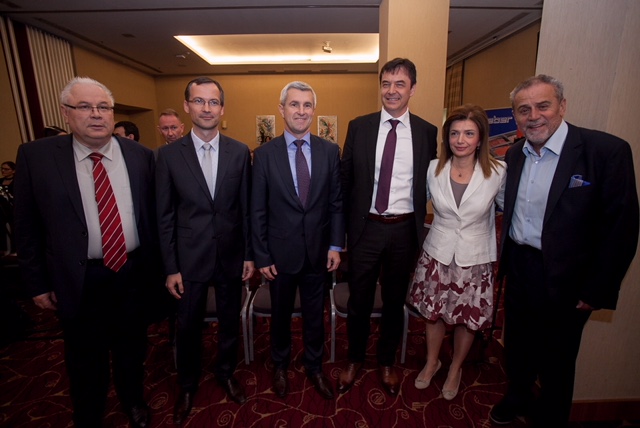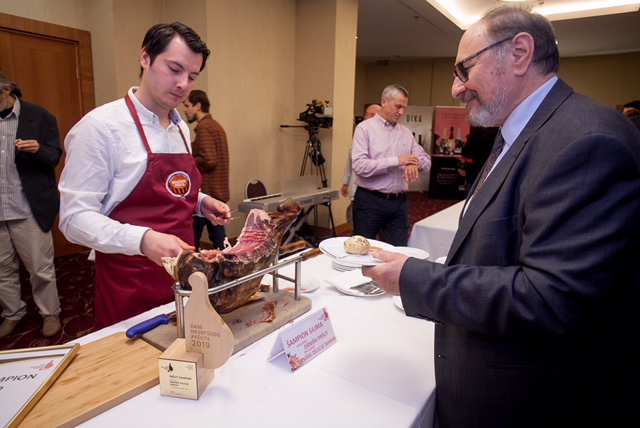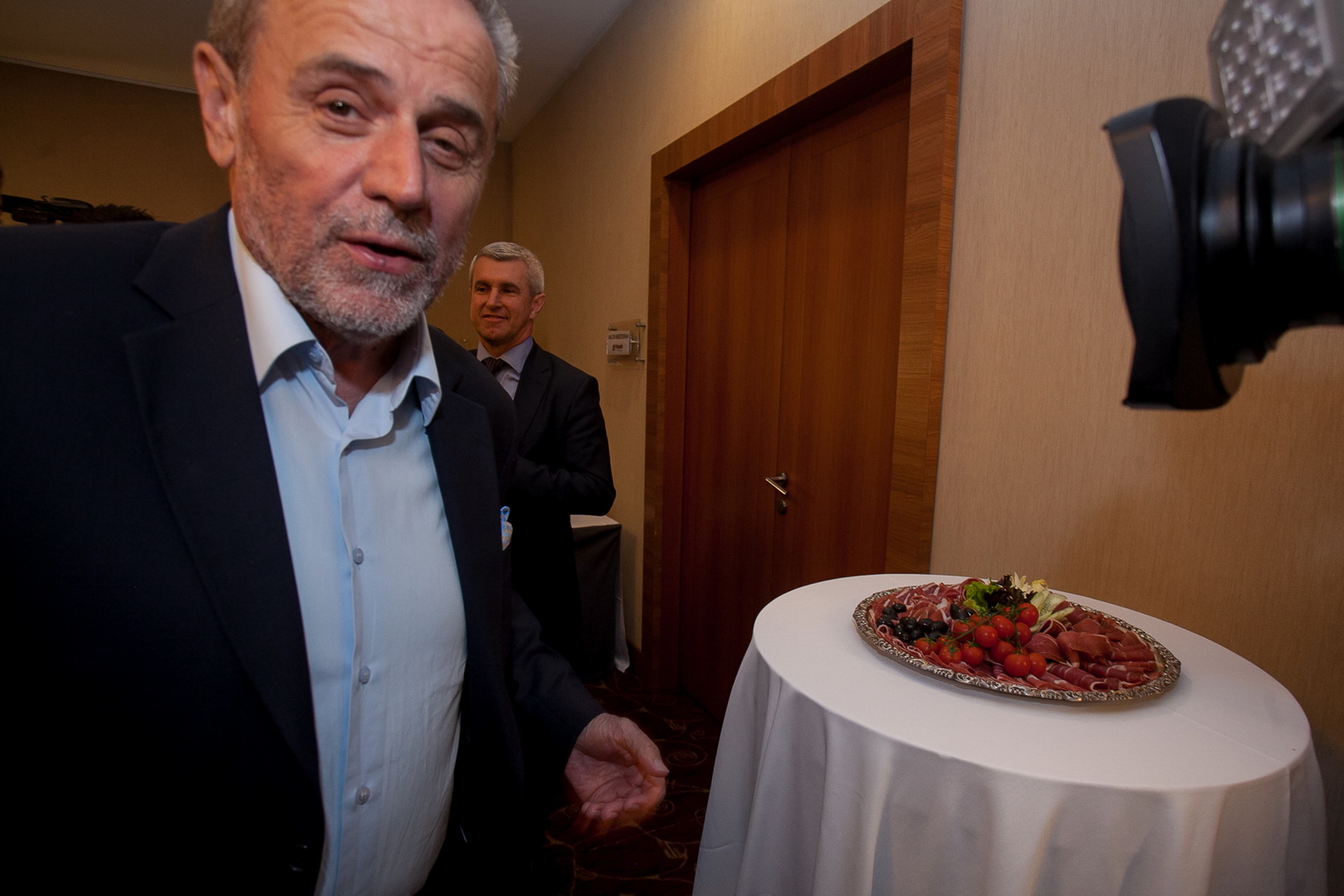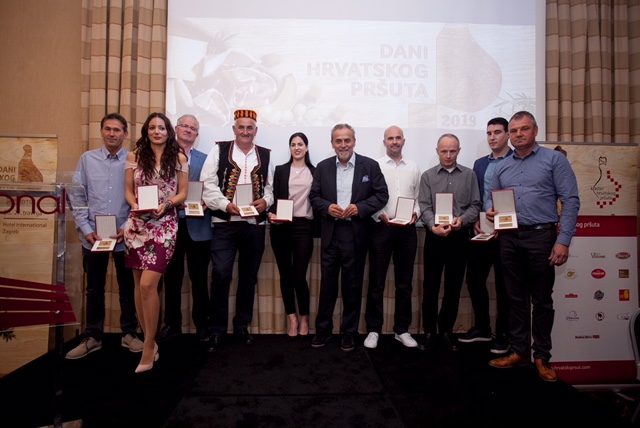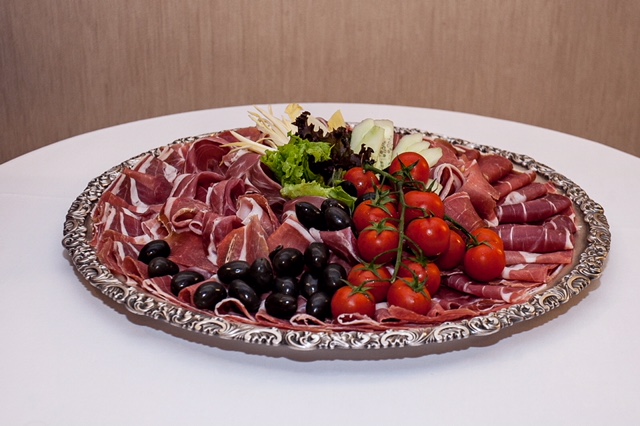Fishing Monitoring Equipment Presented in Šibenik
ZAGREB, May 13, 2019 – The new fishing monitoring system was presented in Šibenik on Monday, with Agriculture Minister Tomislav Tolušić saying other countries hardly had the kind of surveillance equipment Croatia had.
The equipment including drones, boats, vehicles and cameras as well as a fully digitised fishing centre was also seen by Prime Minister Andrej Plenković, Defence Minister Damir Krstičević, Regional Development and EU Funds Minister Gabrijela Žalac and local officials.
Croatia is on the vanguard in the Mediterranean when it comes to the protection of one's own sea resources, Tolušić said, adding that surveillance equipment worth 75 million kuna was purchased over the past two years.
He said the drones, cameras and boats covered all of the Adriatic and that a majority had been financed with EU funds. "It's everything the fishing inspectorate is doing to protect our fish resources and fishermen," he said, adding that the system would be modernised further.
The drones presented today will be used to monitor the sea 60% of the time and in firefighting the rest of the time, it was said.
"Although last year we invested over HRK 20 million in thermographic cameras all over the Adriatic, this is an additional possibility to raise our firefighting readiness," said Tolušić.
Mario Rogošić of the Fishing Authority said the goal was to protect the fishermen who fished legally and punish those who did not. There are 3,500 commercial fishermen in Croatia and 70,000 permits are sold for recreational fishing, he added.
Today and tomorrow Šibenik is hosting a fishing conference.
More fishing news can be found in the Business section.
Conflict of Interest Commission to Investigate Agriculture Minister
ZAGREB, May 7, 2019 - The Conflict of Interest Commission will check Agriculture Minister Tomislav Tolušić's declaration of assets and look into media reports about a company that built a house for him, the Commission's spokeswoman Martina Jurišić told Hina.
According to media reports, the minister had his house built by a company that collaborated with the Virovitica-Podravina County administration while he served as county prefect.
Tolušić stated in his declaration of assets that his house in Virovitica measured 165 square metres, while according to data from the State Geodetic Administration, the property measures 330 square metres in surface area, the Telegram news website said, adding that on this plot there is one more house, measuring 121 square metres, which is not mentioned in the declaration of assets.
Tolušić told reporters outside government headquarters this morning that he thought he had done everything according to law, and if the Commission thought otherwise, he would be glad to rectify it.
He said that the space he lives in measures 153 square metres and denied that there are two houses on his property. "No, there is only one house. You can come and see for yourselves."
More news about the conflict of interest issues can be found in the Politics section.
Days of Croatian Prosciutto Held in Zagreb
On 26th and 27th of April, Zagreb, the capital of Croatia, is also the capital of prosciutto. Prosciuttos from all over Croatia – from Istria to the island of Krk; from the famous Drniš prosciutto to the various Dalmatian prosciuttos – have gathered peacefully and cheerfully as a part of the fifth edition of the Days of Croatian Prosciutto, which are being held in the capital for the first time.
The event was officially opened yesterday morning at the Hotel International. The opening ceremony was attended by Darko Markotić, president of the Croatian Prosciutto cluster; State Secretary at the Ministry of Agriculture Tugomir Majdak; Dragan Kovačević, Vice President for Agriculture and Tourism of the Croatian Chamber of Commerce; and Zagreb Mayor Milan Bandić. The ceremony also included the presentation of special plaques for the excellence in prosciutto making and the selection of the best Croatian prosciutto for this year.
Ten samples were received for tasting, including all certificated Croatian prosciuttos. That the products offered were of exceptional quality is proven by the fact that all samples won gold medals, and the range of points was from high 87.75 to extra-high 95.38. The Drniš prosciutto Drniških Delicija Maran, with 95.38 points, was the absolute winner.
"I am pleasantly surprised with the title, because the competition was strong, although the number of producers is still too low for us to achieve a breakthrough in Europe," said this year's winner Zoran Ćevid, who produces his prosciuttos according to traditional recipes. For high-quality smoked ham, the most important is raw material. It is also necessary that no more than 72 hours pass from slaughter to salting.
"Statistics show that we produced about 250,000 prosciuttos five years ago, but now the number has reached 400,000. That is a large growth of sixty per cent. This is the result of hard work and large investments, perhaps the largest in the food industry sector, amounting to more than 40 million euro. The biggest success is that the share of domestic raw material in our prosciutto production has grown over the past five years from 10 per cent to more than 50 per cent,” said Darko Markotić, president of the Croatian Prosciutto cluster.
"We will provide national financial support to increase primary production and thus get quality raw material for the production of Croatian prosciuttos," said State Secretary at the Ministry of Agriculture Tugomir Majdak, adding that pig breeding is a strategic branch that the government plans to develop.
“In addition to the export potential, the Croatian prosciutto has a great potential in tourism through the top gastronomic offer, because modern tourists are looking for an authentic experience, and it is through gastronomy that they can best learn about the way of life, customs and rich traditions of a particular destination,” said Dragan Kovačević.
Mayor of Zagreb Milan Bandić presented the gold medals, adding that he also produces prosciuttos which the attendees could taste. Special prizes were awarded for the development of prosciutto production to producers Josip Hreljak, owner of Pisinium, the company famous for the production of top Istrian prosciuttos, and Jure Barić, owner of the Opskrba Trade company from Slivno near Imotski, known for the production of Dalmatian prosciutto.
More Croatian food news can be found in the Lifestyle section.
Use of Farmland Becoming Economic and Political Problem
ZAGREB, April 12, 2019 - The use of state-owned farmland is becoming not only an economic but also a political problem that will be difficult to solve without a clear position of the Agriculture Ministry, and the failure to solve it will continue to contribute to the depopulation of rural areas, it was said at a round table discussion on the use of state-owned farmland, held in the eastern city of Osijek on Friday.
Vladimir Margeta of the association of family farms "Život", which organised the event, said that more than a year had passed since the adoption of the State-Owned Farmland Management Act but that less than one-third of development programmes which towns and municipalities submitted to the Agriculture Ministry had been approved, which was why no tenders for grants were being advertised.
Speaking of the renewal of concession agreements with mirror companies from the former Agrokor conglomerate, Margeta said that farmland was the main resource of agricultural production and that it should be privatised as well as that a review of how farmland had been allocated so far should be conducted.
He said that he believed that "this is actually a political decision just as it was when concessions were awarded the first time" and that his association believed that that decision should not be shifted to local government units.
"Some mayors have still not signed extensions of farmland lease contracts and tell us that they are being pressured into doing so as soon as possible. That situation is not good and will result in processes which we have been witnessing in recent years, such as depopulation and low birth rates," said Margeta, noting that people who wished to engage in agriculture could not obtain a contract on the lease of farmland for cultivation or obtained it at a price that was several times higher than the price paid by companies from the former Agrokor conglomerate.
Snježana Kraml, a representative of the Agriculture Ministry, said that the ministry had so far received 381 development programmes, of which 168 had been consented to, and that local government units could start preparing for tenders.
"Programmes that have been prepared well have been forwarded to counties for adoption and those with shortcomings have been returned to local government units for correction, with instructions on how to do it," she said.
Tomislav Panenić, chair of the parliamentary Agriculture Committee, said that under the Farmland Act mayors and municipality heads "can practically decide on their own whether or not they want to sign certain contracts or annexes to contracts", while on the other hand, there was the Emergency Administration in Strategically Important Companies Act, which refers to the former Agrokor group, and under which that could be done by force of law.
Panenić said that the prosecutorial authorities maintained that under the Emergency Administration in Strategically Important Companies Act the signing of lease agreements with companies from the former Agrokor group could be achieved by force of law, and he wondered why that had not been done and why local authorities were being forced to make decisions that were contrary to the interests of their communities.
There is no clear position on the part of the Agriculture Ministry on how the annex signing procedure will unfold and the deadline is very near because May 15 is the deadline for registration for direct payments, Panenić said.
He said that he feared mayors would shift decision-making onto municipal and town councils, which also include local farm producers and which could have problem making decisions to the benefit of successor companies to the Agrokor conglomerate.
"I believe that local officials expect the government to assume that responsibility rather than forcing them to make problematic decisions," said Panenić.
More agriculture news can be found in the Business section.
MPs Warn of Decline in Croatian Wine Production
ZAGREB, March 14, 2019 - The new bill on wine, which was discussed in the parliament on Wednesday, is expected to simplify the legislative framework and facilitate access to the market for Croatian wine makers, while lawmakers warned that wine production had dropped and that more concrete measures were necessary to fight flavescence doree, a disease of the vine.
Domestic wine production has dropped by around 40% since Croatia joined the EU, Davor Vlaović of the Croatian Peasant Party (HSS) and Ivan Pernar of the Živi Zid warned during the debate.
The situation in the wine sector is not satisfactory, exports amount to 5,000 tonnes and imports 26,000 tonnes, and particularly worrying is the growth of imports of bulk wine and low-quality wine, said Vlaović.
The new bill on wine is "a step forward that aims to help wine makers" but more could have been done with incentives and direct payments as well as with more administrative unburdening, said Vlaović.
Božica Makar of the Croatian People's Party (HNS) said that apart from the grey market and negative production and import trends, wine growers also had to deal with problems caused by the flavescence doree vine disease and needed help in fighting it.
Josip Krizanić of the ruling HDZ party proposed budget allocations for the purchase of insecticide to fight the disease.
Tugomir Majdak, the State Secretary at the Agriculture Ministry, said the bill aligned domestic legislation with EU law, adding that 10.2 million kuna had been set aside for its implementation.
The bill envisages decentralisation of wine quality assessment, greater supervision on the ground and a 33% cut in administrative levies.
The bill also abolishes fees for documents necessary to put wine on the market as well as registration labels currently needed to put wine on the market and introduces labelling based on four new wine-making regions - Slavonia and the Croatian Danube region, the Croatian Istria and Kvarner, Dalmatia, and the central and hilly Croatia.
More news about Croatian wines can be found in the Lifestyle section.
National Agricultural Strategy Expected in June
ZAGREB, March 5, 2019 - Agriculture Minister Tomislav Tolušić said on Tuesday that he expected a national agricultural strategy to be adopted in June.
Speaking at a national agricultural conference in the eastern city of Osijek, Tolušić said that the strategy was being drawn up by the World Bank with the participation of Croatian, French, Dutch, American and Greek experts working at the World Bank.
"I expect the strategy to be adopted in June this year, which I think is very soon given that we haven't had one so far," the minister said.
Tolušić said that a tender would be issued this summer for the purchase of about 20 cold storage facilities. "Cold storage facilities will be installed across the country to deal with the problems of our fruit and vegetable growers. The government will build complete public infrastructure with money from the Rural Development Programme. We have agreed this with the European Commission," he said.
Tolušić announced that as of October this year, second- to fifth-year students studying agronomy at any of the colleges in the Slavonia region would be offered an annual scholarship of 10,000 kuna (1,350 euro).
"I think we need to strengthen the agronomic profession in Slavonia, and will be pleased if many of the agronomy students decide to stay to live and work in Slavonia," the minister said.
The conference was attended by some 350 participants, representatives of large, medium and small businesses, family farms, agricultural institutions and the academic community.
More agriculture news can be found in the Business section.
Final Draft of New Law on Wine Forwarded to Parliament
ZAGREB, February 21, 2019 - The Croatian government on Thursday forwarded to the parliament the final law on wine, which proposes reducing the tax burden on winemakers.
Agriculture Minister Tomislav Tolušić said the bill was formulated in cooperation with winemakers and wine growers.
"We have done our best to ease their market position, to make Croatia recognisable as a region that may not have many vineyards compared to other European regions but that has high quality wines and is becoming recognisable for them not only in Europe but around the world as well," said Tolušić.
He said that winemakers had complained about parafiscal levies in wine production, with the state charging them around 2 million kuna annually for registration labels and about ten million for documents necessary to put wine on the market.
"The bill abolishes those parafiscal levies and what has been retained is the LOT number which is sufficient to follow wine from production to sale," he said.
He added that the bill envisaged introducing wine supervisors to step up control of wine production from vineyard to wine cellar with the aim of making the situation on the market more orderly and fighting the grey economy.
The bill also introduces four wine-making regions - Slavonia and the Croatian Danube region, the Croatian Istria and Kvarner, Dalmatia, and the central and hilly Croatia.
The government today also adopted a set of legislative changes regulating the establishment of the State Inspectorate, which as of April 1 should take over the job of inspection currently done by several ministries.
More news on Croatian wines can be found in the Lifestyle section.
Croatian Consumers Sold Food Infected with Bacteria and Mould
The Croatian Food Agency has released a report by the Food Safety Centre on the results of self-control measures implemented by food producers during the last three years. A total of 15,281 food samples were analysed. More than 5,000 samples are processed every year. The results show that Croatian consumers are occasionally sold food infected with bacteria and mould, reports Poslovni.hr on February 1, 2019.
The food samples were analysed against the microbiological parameters in accordance with the Microbiological Food Criteria Decree and Guide, and the results have been processed together and summarised, according to the Croatian Agricultural and Food Agency's report. It should be noted that the report by the Food Safety Centre does not state during which three years the inspections were carried out.
The results of the report indicate the presence of an increased number of aerobic mesophilic bacteria in most food categories. They are followed by enterobacteria, then moulds and yeasts, and in a small number of food categories, the contamination with bacteria was also established.
It should be noted that the increased number of aerobic mesophilic bacteria in food usually indicates old food and food with poorer microbiological quality.
Food safety is an imperative in placing the products on the market, which is why in the food industry, at the industrial and crafts level, the production is regulated by a number of regulations (laws, decisions, regulations, guides) whose criteria the food must meet at the time of manufacture and when being placed on the market, until the end of its stated shelf life.
EU rules on food hygiene throughout the food chain are the same in all member states. Food business entities bear the primary responsibility for food safety. This means that, according to the legal provisions, the entities are obliged to establish a self-control system for their production so that the food they produce satisfies the food safety criteria.
Translated from Poslovni.hr.
More news on the Croatian agriculture and food sector can be found in the Business section.
Tolušić Case Called “Most Perfidious Attempt to Destabilise Government”
ZAGREB, January 23, 2019 - Prime Minister Andrej Plenković said on Wednesday that the 'Tolušić case' was the most perfidious attempt to compromise and destabilise government so far, dismissing insinuations that this was a "PR attempt" by the ruling coalition to divert attention from other topics.
"We have already seen fabricated text messages between state prosecutors, judges, prime minister, deputy prime ministers, but we haven't seen anything like this before," Plenković said at the start of a cabinet meeting, saying that that the attempt to fabricate compromising photographs of deputy prime minister and Economy Minister Tomislav Tolušić was the main topic over the past several days.
Plenković said he was particularly surprised by the comments of some political stakeholders and some media who claim this is all part of "the PR attempt to divert attention from some other topics." We are not that creative and we are not into business of doing that, Plenković said.
The prime minister stressed that everyone in the government was outraged by the attempt to besmirch Minister Tolušić, which objectively could have had serious consequences for his private life as well. "This deserves strongest condemnation and of course, I expect the authorities to find the perpetrator and discover their motive," Plenković said.
The prime minister added that regardless of all attempts to destabilise the authorities, the government would continue to do its job.
In the end he thanked the owner and editor in chief of the Nacional weekly who published the information about the Tolušić case, acted reasonably and informed the Security and Intelligence Agency about it immediately, which soon after that established that it was a doctored photo..
The Nacional weekly on Tuesday ran an article under the headline "A hooker and cocaine in professional set-up against Tomislav Tolušić". The article is accompanied by fake photos aimed at discrediting the minister. The weekly claims that the photomontage showing Tolušić with a prostitute and cocaine was aimed at discrediting and politically destroying Prime Minister Andrej Plenković and Minister Tolušić. The weekly said it had obtained the photos from an anonymous source.
The Security and Intelligence Agency (SOA), which has also received the photos in the meantime, has found them to be fabrications. Other minister also condemned the fake photographs.
More news on the agriculture minister can be found in the Politics section.
Government Condemns Publication of Fake Photos of Agriculture Minister
ZAGREB, January 22, 2019 - The Croatian government on Tuesday condemned in the strongest terms the publication of photos purportedly depicting Agriculture Minister Tomislav Tolušić in a defamatory situation, describing them as perfidious and illegal hoax meant to discredit top state officials.
The government expects the law-enforcement and prosecutorial authorities to investigate this case and find the perpetrators of "yet another extremely insidious attempt to destabilise the government and the legal order."
The Nacional weekly published on Tuesday an article with the headline "A whore, cocaine in professional set-up against Tomislav Tolušić", and the article is accompanied by the fake photos aimed at discrediting the minister.
The weekly newspaper has said that it has obtained the disputable photos from an anonymous source.
The Security and Intelligence Agency (SOA), which has also got the photos in the meantime, established that they are fabrications, the newspaper said.
The case prompted the government to issue a press release in which it condemns in the strongest terms the appearance of fake photos as perfidious and illegal hoax aimed at discrediting top state officials.
The government expects the police and the Office of Chief State Prosecutor to investigate the case and find the perpetrators of this insidious attempt to destabilise the government and to affect the legal order through the dissemination of fabricated information against state office-holders.
More news on the agriculture minister can be found in the Politics section.

